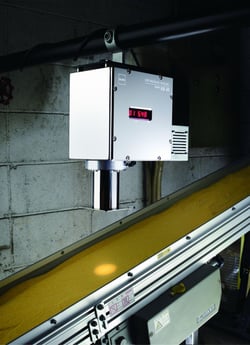 Cornmeal is made by crushing dry corn kernels and is a popular food product due to its relatively long shelf life. It is a widely-used staple food throughout the world, and those with gluten intolerances find it a useful alternative to wheat flour, especially when finely ground into corn flour.
Cornmeal is made by crushing dry corn kernels and is a popular food product due to its relatively long shelf life. It is a widely-used staple food throughout the world, and those with gluten intolerances find it a useful alternative to wheat flour, especially when finely ground into corn flour.
Cornmeal is also a good source of fiber and is rich in nutrients like potassium, phosphorus, iron, zinc, magnesium, and niacin. Because of all of these properties, it is used across the food industry for baking, processed foods, fast foods, and snack foods. It is also a sustainable source of food in a world with an ever-increasing population.
Moisture content is the key to a viable cornmeal product throughout production, transportation, and storage. Here is how moisture levels can impact the creation and storage of cornmeal.
Moisture and Cornmeal Processing
Cornmeal is made from dried corn kernels that are ground into varying textures based on their intended use, but the process is not as simple as it sounds. Corn must pass through many stages after harvest and drying before it can be processed and turned into cornmeal. These stages include:
- Cleaning
- De-germination
- Milling
- Sifting
- Packaging
Typically, corn is ready for harvest at 15.5% moisture. Masa, one particular form of cornmeal used in the production of foods like tamales, tortillas, and corn chips, must reach a moisture level of 8%; 10% after cooking and milling. Since moisture levels can reach as high as 48% to 53% during the processing of cornmeal, it is important to monitor cornmeal during the drying process to be sure it reaches its fully-dried state, somewhere between 8% and 10% moisture. In other kinds of cornmeal, typical moisture levels should never exceed 14% for coarsely ground meal or 10% moisture for fine-ground corn flour.
Moisture content can also impact the profits a farmer or processor makes from cornmeal. Too much moisture and the product can spoil, but too little moisture and the product, which is sold by weight, loses some of its deserved value.
An in-line moisture meter is immensely helpful in monitoring these moisture levels as cornmeal is processed. Kett’s KB30 Inline Near-Infrared (NIR) Moisture Meter has a refresh rate of 0.2 seconds and can be used to monitor extremely variable products like cornmeal when accurate measurements are critical.
Cornmeal Flowability and Moisture
Even after being produced, the moisture levels of cornmeal need to be monitored. Too much or too little moisture will affect the flowability of cornmeal. Knowing the flow behavior of cornmeal and how it affects its physical properties is important for the efficient storage and handling of this widely used food product.
When it comes to cornmeal, essential operations like blending, transfer, storage, compaction, and fluidization are all dependent upon proper powder flowability. Moisture present in powders like cornmeal is one of the main factors that can affect the stability of cornmeal.
Additionally, environments that are rich in moisture encourage microbial growth, and when cornmeal absorbs too much moisture, it’s not only susceptible to spoilage, but it can also lead to a change in its flow properties, creating storage and handling issues such as:
- Vertical holes at the top surface of the powder in the storage bin, otherwise known as rat-holing
- Arching and the formation of cohesive, liquid “bridges” that can result in caking which impedes the flow of the cornmeal
To counteract these kinds of issues, conditioners or anti-caking agents can be added to cornmeal, but these conditioners slow the flow of the cornmeal and can only be used in limited proportions as required by the Food and Drug Administration.
Again, the KB30 can be used to monitor cornmeal moisture levels as the product is transferred, and anytime the product needs to reach maximum flowability with minimal added conditioners. Kett has been in the business of providing growers and food processors the laboratory-quality test equipment they need to optimize products like cornmeal for decades. To learn more about what we can do for you, contact us today!